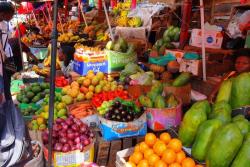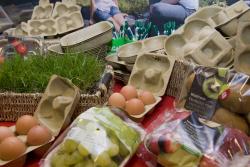Packaging our foods without plastic
 Fresh produce reaching a Ugandan market placePeople worldwide are increasingly concerned by the amount of single use plastic which surrounds our purchases, and in particular our food shopping.
Fresh produce reaching a Ugandan market placePeople worldwide are increasingly concerned by the amount of single use plastic which surrounds our purchases, and in particular our food shopping.
While such wrappings appear unnecessary, many fruit and vegetable producers would argue that packaging perishables ensures that consumers can easily carry away their food. Further, more food reaches the market place undamaged, increasing the food supply and reducing food waste.
The solution lies in developing sustainable food packaging alternatives.
One such project is adapting proven technology from Wales to provide the Ugandan food industry with sustainable food packaging, made from waste natural materials. It is estimated that 30-40% of Uganda’s fruit and vegetable are wasted before reaching the market, as they are not adequately protected. This wastage rises to 60% for tomatoes, and contributes to food hunger in Uganda, where 41% of the population is undernourished. Further, bruises on such foods increases contamination which reduces quality of foods and may lead to food poisoning.
Experts from Bangor University’s BioComposites Centre have already developed a range of food packing made out of grass in partnership with UK supermarket, Waitrose, one of the UK’s largest fresh food distributors. They are now collaborating with Makerere University, Uganda to work with female-led smallholders in Uganda to use their waste maize (called stover) to create biodegradable food packaging.
Making use of the leaves, stalks and cobs left in the field after harvesting the maize will provide smallholders with a new income stream.
Dr Stephen Lwasa from Makerere University’s, College of Agriculture & Environmental Sciences said:
 Some of the grass-based packaging is being used by a major UK supermarket.“The partnership that we have with Bangor University, and other partners, to use maize waste to produce packaging materials is an exciting opportunity for our farmers and other value chain actors. This is because post-harvest losses will be reduced, the product quality will be maintained, and opportunities to market these packaging materials and products in high end markets, will increase streams of incomes for the players involved.
Some of the grass-based packaging is being used by a major UK supermarket.“The partnership that we have with Bangor University, and other partners, to use maize waste to produce packaging materials is an exciting opportunity for our farmers and other value chain actors. This is because post-harvest losses will be reduced, the product quality will be maintained, and opportunities to market these packaging materials and products in high end markets, will increase streams of incomes for the players involved.
I call upon the project partners (NAFICI, Oribags and Musabody) to give this project their very best, and also call upon the support of more stakeholders to make this dream a reality”
The DFID funded Innovate UK feasibility project is collaborating with two industrial partners in Uganda- Musabody, an agricultural machinery manufacturer and Oribags, a packaging company that develops and manufactures hand-made biodegradable packaging bags and a UK company, NER Ltd, an innovative company that has developed environmentally friendly processes for pulping straw.
Bangor University’s BioComposites Centre has over 30 years of technical know-how in replacing non-renewable products and components with alternatives developed from sustainable raw materials.
Dr Adam Charlton, Senior Research fellow at the University’s BioComposites Centre said:
“The green egg boxes and other moulded food packaging produced from our original concept can be found in Waitrose supermarkets across the country and have been well received by customers.
This project is an opportunity to share our experience of collaborative research to help Uganda’s emerging bioeconomy to develop further. This type of technology transfer can lead to new products which will hopefully create a new income stream for some of Uganda’s agricultural small holders.’’
See also: https://www.bbc.co.uk/news/uk-wales-50394607
Publication date: 13 November 2019
